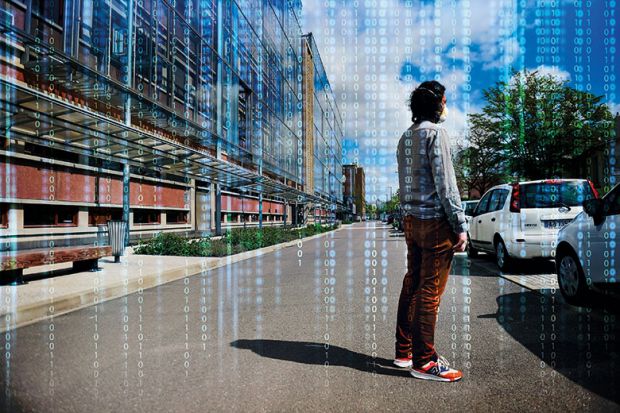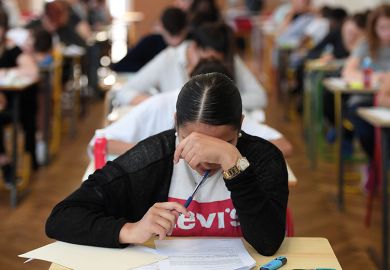By March 2020, the colossal scale of the coronavirus pandemic was clear. Universities around the world quickly closed campuses to protect their students and staff and to slow the spread of the virus. However, determined not to abandon their raison d’être – teaching and learning – they rapidly opened again, this time online.
According to Unesco, 89.5 per cent of the world’s learners, which includes those enrolled at universities, are now being taught online, largely because of lockdowns in place to tackle the spread of Covid-19.
There were universities that were better prepared than others, but no one could have expected that their institution would have to transition quite so quickly – often in a matter of days – to teaching thousands of students online. Faced with this new landscape, a huge number of institutions have turned to existing online learning platforms to help with their provision.
This is exemplified by the success of an initiative from Open Classrooms, a Paris-based platform that offers online, state-endorsed bachelor’s and master’s degrees with individual mentorship, which opened up all its content for free to academic institutions in need of assistance during the crisis.
“We began to roll it out country by country depending on when a lockdown was announced,” Pierre Dubuc, the founder and chief executive of Open Classrooms, told Times Higher Education. “Since then, there has been a huge acceleration. It has gone way beyond our expectations.”
Initially, the offer was made to French institutions and those in neighbouring francophone countries, but as the restrictions spread, Open Classrooms extended it to the UK and the US, where even universities in states without official lockdowns signed up. The offer has now been taken up in Canada and in many African countries.
Already, there are 1,200 institutions benefiting from the initiative, translating to some 120,000 students, Mr Dubuc said. “We’ve seen it ramping up as more and more regions in the world move to a lockdown.”
There are some institutions that already had a platform and content and have used the initiative to offer something extra to their students, he said. “Whereas others really are a blank page: they have no platform, no content and, therefore, no continuity at all. If they don’t leverage a platform like ours, students won’t have any teaching.”
This makes the specifics of what Open Classrooms is offering even more important: it can provide not only educational content and courses but also training for teachers on how to teach online. “This includes how to use digital tools and how to communicate using them,” Mr Dubuc said.

“Even within one institution, there can be a wide spectrum of readiness for online teaching. So to ensure academic continuity, we felt it was important to work with the institutions and teachers themselves so they could understand what is needed,” he said.
Open Classrooms offers training on how to create online-specific courses and how to switch from a lecture-based curriculum to a project-based one. “Online is different to face-to-face; you can’t just provide a two-hour video lecture, it doesn’t work,” he said. “It’s a different culture.”
Mr Dubuc added that ensuring regular communication with students was incredibly important, as was understanding that some students lack digital skills or the necessary technology. “What if they don’t have access to that at home, or even a quiet place to study? Institutions need to be aware and help to mitigate those problems. They need to make sure they are tracking and communicating with their students, so that no one is left on the sidelines,” he said.
Open Classrooms is not the only online education platform to have quickly thrown open its content in the wake of the coronavirus outbreak. Others include such well-known names as UK-based FutureLearn and California-based Coursera.
FutureLearn launched FutureLearn Campus, which allows universities to provide their students and staff with unlimited access to online courses delivered through the platform, in addition to courses for the wider public as previously. Its chief executive, Simon Nelson, agreed that academics would need to learn the difference between face-to-face teaching and teaching online.
The demand was so great for the platform, Mr Nelson told THE, that “we realised we couldn’t hand-hold everyone through this, so we decided to develop a course called How to Teach Online”. Within days, 30,000 people had signed up.
Mr Nelson said that, in the wake of the crisis, universities had shifted immediately into “business resilience mode” and had simply replicated their traditional learning environment on the web – but, as time goes on, they will have to develop their offerings. Institutions such as the Open University, which initially launched FutureLearn and has always offered online learning, are “50 years ahead in this”, he said.
For Mr Nelson, although there will be some difficult experiences ahead for universities, the response to the coronavirus will cause a “paradigm shift” in how higher education is taught. “I just can’t see people going back to the way it was, not only because there is a high chance that an outbreak like this will happen again, but because the crisis has shown up inefficiencies in university business models and challenged perceptions about online learning,” he said.
Mr Dubuc agreed. “Even when the lockdowns end, it won’t be a simple on/off switch when it comes to online learning,” he said. He pointed out that as the virus outbreak slowed in China and the country’s institutions gradually reopened, “e-learning has peaked, rather than decreased”.
Part of this reflected the effect the pandemic has had on economies and the jobs market, Mr Dubuc said. Unemployment is rising in every country, and it will become harder to get a job, so jobseekers will turn to education to boost their chances, he explained.
This trend will require universities to offer more skills-oriented education alongside traditional academic offerings − and online-based learning works well for this, he said. “To do online learning well, rather than relying on lectures, you have more learning-by-doing, project-based or competencies-based pedagogies, group projects and that kind of thing, which have a greater connection to career prospects,” Mr Dubuc explained. It’s a way for universities to be closer to the needs of employers and the jobs market, he added.
Jeff Maggioncalda, chief executive of Coursera, which made its entire course catalogue free to universities worldwide in March, agreed that a shift to online learning offered the chance to link academic approaches with more skills-based methods. Research and academic theory have clear benefits to society, but the premium on employment and skills-based learning will rise, he said. Online platforms, which traditionally have strong ties with business, can facilitate a more hybrid approach in future, he said.
Eventually, students will return to campus, because they get more out of the experience than just the lessons, but Mr Maggioncalda predicted that there would be much greater use of blended learning on campus. “Institutions will see that they are genuinely able to offer this,” he said. “Also, if there is another outbreak, many professors are in the high-risk category and they might want to stay at home to teach.
“We won’t go back to normal,” he added. The initial moves to online provision were “triage”, but universities now face the likelihood of still being online in autumn 2020. Institutions must consider what they need to do longer term to ensure that they are still offering students exceptional education online, he said.
Sian Bayne, professor of digital education at the University of Edinburgh, said she was optimistic about the shift to online learning. “Stressful though it is for teachers and students, [the changes] will in the end give universities a lot more confidence around doing things digitally, where it makes sense to. It’s been a massive digital sprint that, longer term, will have big, mostly positive, effects on our willingness to try new approaches,” she said.
For Neil Morris, professor of educational technology at the University of Leeds, the current crisis has allowed good online platforms to “prove their value”. Massive open online courses were misunderstood in the past, but they have come into their own during the crisis, he said. This is because they not only provide supplementary learning resources but also collaborative and social spaces for interaction between students, he added.
However, Professor Morris warned that there would be universities that remained wary of partnering with online third parties because they fear students might find they prefer learning on these platforms and abandon institutions permanently. “The platforms are important to us, but these tensions still exist,” he said.
For universities, the next step is designing high-quality lessons that students will pay for, however they can, he said. Most students did not sign up for online learning, and for those preparing for a university education, it could affect where they end up going.
“For some universities, the transition will be a huge strain,” Professor Morris said. “The new academic year is six months away – in terms of the scale of universities, that is nothing. The challenge will be enormous.”
However, he added that he had already seen a positive response from staff and predicted that universities would eventually move to a “proper blended learning approach to teaching” when some form of normality returns.
Although universities will not shift to fully online degrees once the crisis is over, they will be able to “enrich and enhance their campus-based education through what they’ve learned and the partnerships they made”, he said.
Register to continue
Why register?
- Registration is free and only takes a moment
- Once registered, you can read 3 articles a month
- Sign up for our newsletter
Subscribe
Or subscribe for unlimited access to:
- Unlimited access to news, views, insights & reviews
- Digital editions
- Digital access to THE’s university and college rankings analysis
Already registered or a current subscriber?








